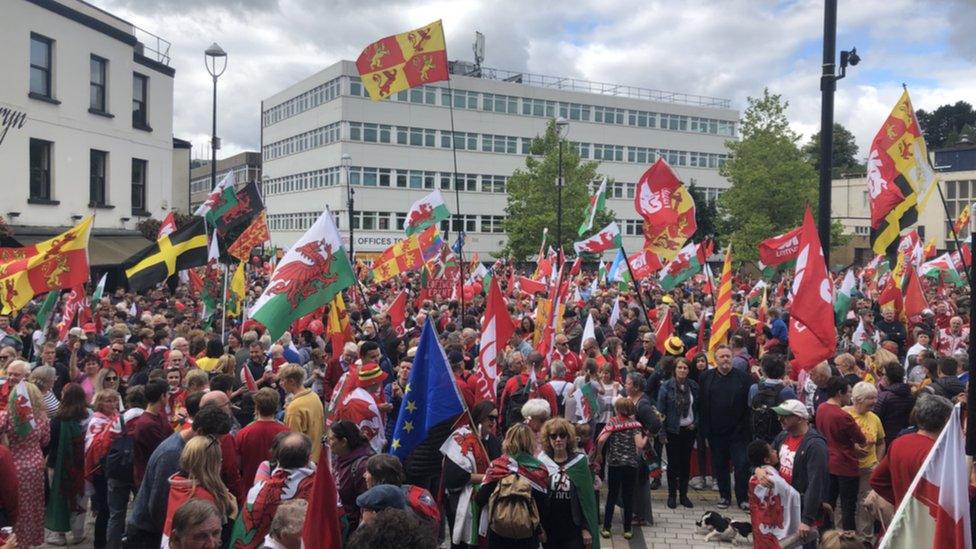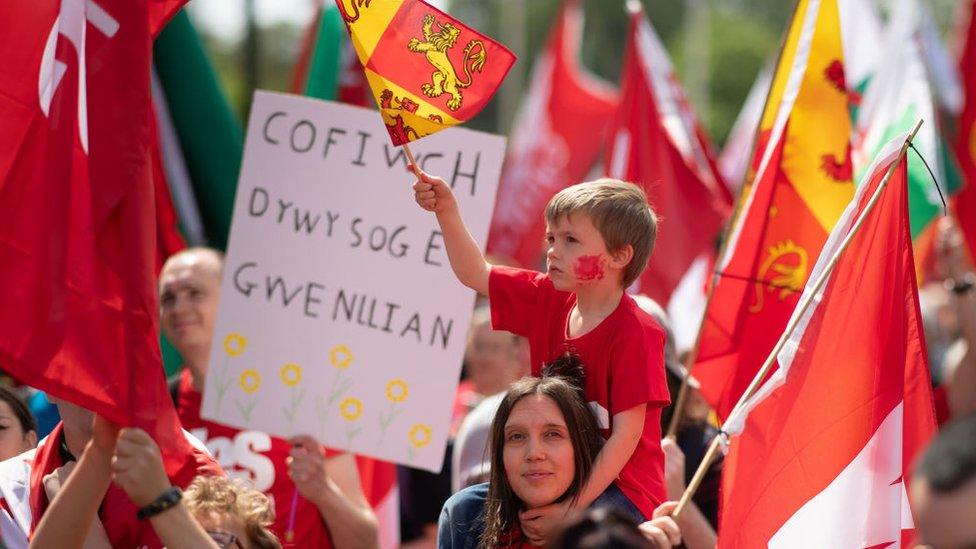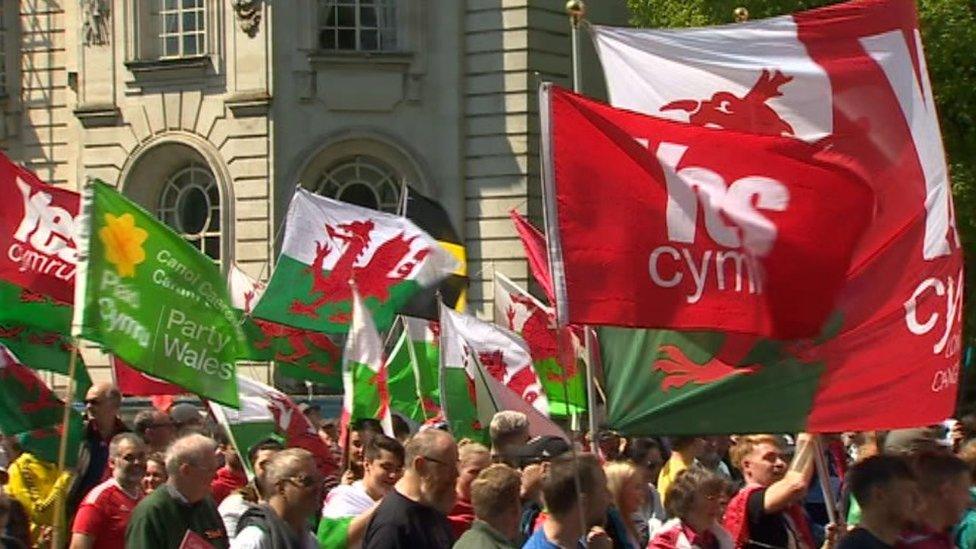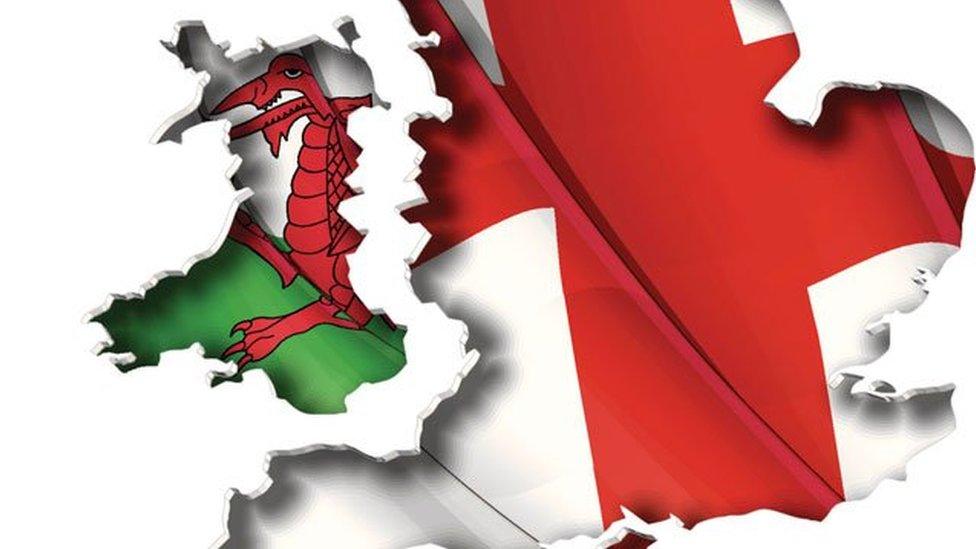Yes Cymru: Independence 'not possible' without political change
- Published
The number of people who had attended pre-Covid marches and polls had suggested support for independence is on the rise.
A path to independence is not possible without major changes in the Welsh political landscape, the chairman of Yes Cymru has said.
The pro-indy campaign group has seen an upswell in recent months, with membership said to have jumped to over 17,000.
Chairman Sion Jobbins said devolution had reached a "cul de sac" and changes were needed in Cardiff Bay.
Mr Jobbins said: "The status quo is not an option".
When it was launched in 2016, just a few hundred people turned up to demonstrations, but organisers say that membership has swelled from 2,000, at the start of 2020 to over 17,000.
Mr Jobbins said Yes Cymru had created a "mass movement" towards independence, and the group was working to reach more people who would not normally be politically engaged.
He told BBC Politics Wales that the movement would not be supporting one political party at the May Senedd elections, instead urging its members to make their own choice on polling day.
He said the group would be contacting all candidates to ask them their views on independence ahead of polling day, and then make it publicly available.
But Mr Jobbins said a government needed to be elected in May which "has a path to independence".
The group contains Labour supporters and members but official party policy is support for devolution within the United Kingdom.
Political parties Plaid Cymru, the Green Party, Gwlad Gwlad, and Propel if it is registered in time, would all stand on pro-independence platforms.
Mr Jobbins added: "If there's no change in Cardiff Bay, there is no independence and this is a message also to Yes Cymru supporters".
"Our individual members, supporters have to make their own personal choice.
"Yes, there is a tension there, there's no denying that... we have a lot of members who are members of the Labour Party," he said.
"Certainly, there needs to be a party there [in the Welsh Parliament], which supports independence and either forces another partner to have a clear pathway to trigger independence or it's not going to happen and our supporters need to understand that."

Crowds gathered in Merthyr Tydfil before the coronavirus pandemic during independence marches
A row broke out on Twitter recently following a post from the Yes Cymru account saying "it's Unionism we take umbrage with" not Conservatism.
Asked if there was room for Conservatism in the group, Mr Jobbins said: "I think there is.
"We know about 10% of people who vote Tory actually would vote for independence... there is room there for conservative-minded people."
What would independence look like?

Thousands attended independence marches in 2019
Asked by BBC Politics Wales what Welsh independence looks like, he said: "For Yes Cymru, there's two basic things, which is international recognition, so a seat in the United Nations. And then our own written constitution.
"Does it mean we have the monarchy? That's another question. Does it mean we're in NATO? That's another question. Does it mean we have our own currency? That again is a different question.
"That's for other groups to organise and to campaign for or against," he added.
Mr Jobbins welcomed Plaid Cymru's independence commission report as a "very big, important step".
He added the report's recommendation of a possible confederal model, whereby an independent Wales would look to pool resources with England and Scotland, is "totally compatible with being an independent country".
The authors of the Plaid-commissioned report outlined the economic difficulties they believe would face an independent Wales.
In the report they say: "It remains hard not to be brought back down to earth by the short, medium - or even long-term cost implications of opting for independence."
Mr Jobbins said he "would disagree with that" but that "it is a challenge".
He added: "In the 1960s, the Welsh economy was double the size of the economy of the Irish Republic.
"Today, the Irish Republic's economy is four times bigger than Wales' and that's going to get worse.
"It would be a challenge, yes, but we still have a challenge if we stay here. The status quo is not an option and with independence we have all the tools at our disposal".
- Published25 September 2020

- Published18 June 2019

- Published18 July 2019
